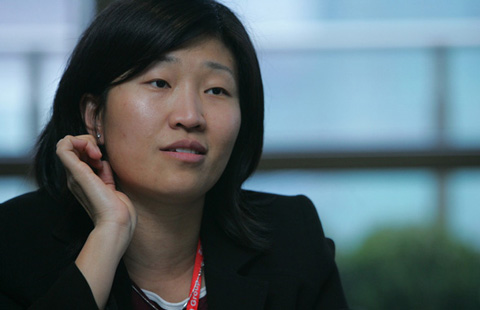Cui rebuffs US stance on S. China Sea
Updated: 2015-05-14 13:45
By CHEN WEIHUA and DONG LESHUO in Washington and MO JINGXI in Beijing(China Daily USA)
|
||||||||
Chinese Ambassador to the United States Cui Tiankai on Wednesday rebuffed US criticism that China's land reclamations were responsible for the tensions in the South China Sea.
Daniel Russel, US assistant secretary of state for East Asian and Pacific affairs, and David Shear, assistant secretary of defense for Asian and Pacific security affairs, both blamed China for the tensions in the East and South China Seas during a hearing at the Senate Foreign Relations Committee Wednesday afternoon, noting in particular the recent land reclamation.
"Who is really raising tensions in the South China Sea? Is the high-profile US involvement (in the region) stabilizing or messing up the situation, the facts are all out there," Cui told reporters on Wednesday evening on the sidelines of a reception at the Chinese embassy in Washington.
His views are shared by most Chinese that the US is biased in the maritime territorial disputes in the South and East China Seas in favor of its allies in a bid to keep its primacy in the region.
Cui defended the Chinese land reclamation by saying that all China has been doing is within its sovereign rights. "We have not reclaimed land in other's sovereign space. On the contrary, when some countries built land features on Chinese sovereign isles and reefs in the past, the US did not seem to have made a sound," Cui said.
"Should the US apply the same criteria?" he asked.
Cui's words came after Chinese Foreign Ministry spokeswoman Hua Chunying expressed "serious concern" on Wednesday over a reported Pentagon plan to send military ships and aircraft into areas near South China Sea reefs and demanded that Washington issue an immediate clarification.
"We request the parties concerned to speak and act in a cautious manner, not to take any risky or provocative actions and to maintain regional peace and stability," Hua told a news conference in Beijing on Wednesday.
Cui questioned whether such a show of force can actually solve problems. "Maybe some are used to the thinking of using force at will and a Cold War mentality, but that's out-of-date," he said.
Through peaceful and diplomatic means, China has successfully solved border disputes in the past decades with 12 countries that share land boundaries, something that has won applause in the international community. Cui believes China can also solve the maritime territorial disputes with related countries.
Cui also reiterated China's stance of opposing the close-in surveillance by US military aircraft and vessels, saying that China has raised this to the US repeatedly.
On Monday, a Chinese frigate monitored the activities of a US combat ship in waters near Nanwei Island in the South China Sea.
Hua, the spokeswoman, said China will continue its surveillance of the waters and airspace to ensure territorial sovereignty and safety.
According to a Wall Street Journal report, US Secretary of Defense Ash Carter asked his staff to look at options that include flying Navy surveillance aircraft over South China Sea islands and positioning ships as close as 12 nautical miles from Chinese reefs. Twelve nautical miles is the United Nations' standard for the breadth of a country's territorial sea, measured from specific baselines.
"We are considering how to demonstrate freedom of navigation in an area that is critical to world trade," a US official was quoted by Reuters as saying.
China has always upheld freedom of navigation in the South China Sea, Hua said, but that doesn't mean any foreign military ship or plane can enter the territorial waters or airspace of another country at will.
While the US blamed China for the land reclamation in the South China Sea, other claimants have engaged in construction much earlier than China. David Shear, the assistant secretary of defense, told the hearings that in the Spratly (Nansha) Islands, Vietnam has 48 outposts; the Philippines, 8; China, 8; Malaysia, 5, and China's Taiwan, 1.
Shear said that despite the differences, the US is working to build transparency and improve understanding with China through military-to-military ties.
"Over the past year, through initiatives like the confidence-building measures our two presidents agreed to last fall, we have made significant and prudent progress in our bilateral defense relationship. This year, we will be working to complete another measure that aims to prevent dangerous air-to-air encounters," Shear said.
US Secretary of State John Kerry is due to visit China this weekend to prepare for key talks later this year, including the annual US-China Strategic and Economic Dialogue. The South China Sea could be a topic of his discussion with senior Chinese leaders.
"I think that neither the US nor China wants to see the region dominated by a hostile power. Why? The presumption is because such a power would act to undermine the other power," said Michael Swaine, senior associate at the Carnegie Endowment for International Peace.
"In this particular case, I think China and the US have the same level of high commitment to a region that is stable and prosperous," Swaine said on Wednesday.
Chen Qinghong, a Southeast Asian studies researcher at the China Institutes of Contemporary International Relations, said that Washington, which is worried about China's construction work on islands in the South China Sea, is trying to stir up trouble in the area.
"Once China does anything in response, the US might use it as an excuse to justify its challenge to China's territorial sovereignty in the South China Sea," Chen said.
Contact the writers at chenweihua@chinadailyusa.com and mojingxi@chinadaily.com.cn.

 Cannes Film Festival unrolls star-studded red carpet
Cannes Film Festival unrolls star-studded red carpet
 Amazing artworks in supermarkets
Amazing artworks in supermarkets
 Top 10 venture investors in the world
Top 10 venture investors in the world
 Ten photos you don't wanna miss - May 14
Ten photos you don't wanna miss - May 14
 Classical private school in Qinling Mountain
Classical private school in Qinling Mountain
 Heads of state show you around Xi'an
Heads of state show you around Xi'an
 Cross dressing for Peking Opera
Cross dressing for Peking Opera
 Ten photos you don't wanna miss - May 13
Ten photos you don't wanna miss - May 13
Most Viewed
Editor's Picks

|

|

|

|

|

|
Today's Top News
Xi to give Modi a hometown welcome
Aviation, railway top Li's agenda for Latin America
Cui rebuffs US stance on
S. China Sea
China set to delay maiden flight of C919 commercial jet
Police warn 'strange outfits' on subway may cause stampedes
At least six die in Philadelphia train derailment, scores hurt
Cui: How to get a win-win in Asia
Animated Deng Xiaoping set to hit silver screen this week
US Weekly

|

|






